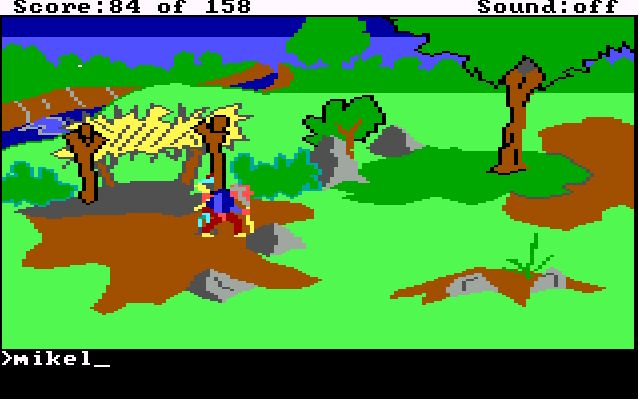 In 1976 a little game called Adventure, designed by Will Crowther, a programmer and spelunking enthusiast, was unleashed onto the masses. With a vast array of locations and a quirky sense of humors, thi was to be the first of many Adventures Game to publically grace computer based entertainment.
In 1976 a little game called Adventure, designed by Will Crowther, a programmer and spelunking enthusiast, was unleashed onto the masses. With a vast array of locations and a quirky sense of humors, thi was to be the first of many Adventures Game to publically grace computer based entertainment.
Several years later Scott Adams – a fan of the original Adventure – founded Adventure International; which he then used to publish his own port of the game titled Adventureland. This was the first ever commercially sold adventure game. Text based adventures continued to flourish during the late 70s and 80s, with immortal titles such as Zork or Hitchhiker’s Guide to the Galaxy being a part of that. The games would often include a wealth of free goodies in the box that weren’t crappy DVD ‘making of’ movies or tin cases/slip covers.
In the early 80s however, On-Line Systems – a company which would later be known as Sierra, added perhaps the greatest innovation known to Adventure Gamekind. Mind blowing migs and megs of graphical power.

Iteration after iteration of the adventure game genre happenend over the years. First they added vector graphics, then they added bitmap graphics, next some crazy bastard suggested they add moving characters in a third person perspective rather than first person images of whatever you’re looking at. Crazier still, characters started to move around on screen, following your every arrow key press and doing your crazed bidding as you typed Get Ye Flask into the text parser. Eventually the long years of frustration garnered over the phrase “I don’t understand the phrase Get Ye Flask” and trying to pick just the right word hit its breaking point and someone finally implimented a GUI into the games.

The late 80s and 90s from then on were filled with the glory of (primarily) Sierra and Lucasarts adventure games. Game after game written and developed by some of the industry’s best and brightest, adventure games were the genre to make – with ports of most games going on any system capable of handling a mouse as a method of input. Eventually CD Roms became the industry’s chosen method of data storage, and with it adventure games once again prospered. With such a large space to work with the Talkies became popular – often rereleasing upgraded ports of previous games with well cast voice acting and higher quality music that didn’t rely on the bult in midi speaker of your computer. And all was great and well in the Adventure Game Community as the games rose to a new golden age in the early to mid 90s. And all was well and good. For a time.
Upon the advent of 3d gaming things started to take a turn for the worse. More action oriented games, particuarly first person shooters, became the mainstay of the PC based games industry. Publishers started to become wary of pumping money into games that didn’t have a third dimension with fancy polygons and lighting effects, and the Adventure Game market slowly died. First Sierra folded as a make of Adventure Games and then Lucasarts – dispite trying to move towards 3d adventure games also closed shop on that front.
For a long time, very little of any real note happened as far as adventure games go. The nail in the coffin came in 2004, when after 2 years of development – taunting adventure gamers with the prospect of a revival of the genre – Lucasarts unceremoniously cancelled it as it neared completion. Combined with the cancellation of the action based sequel to Full Throttle, adventure games seemed well and truly dead a we knew it. Lucasarts confirmed this by totally closing the Adventure Game studio, resulting in some of the staff leaving to form Telltale Games.

Although Telltale got off to a bumpy start with their, light on actual game, adaptations of the Bone series. As mid-2005 approached and fans became aware that Lucasarts’ license over Sam & Max was near to expiring many held their breath in hopes that someone more willing to use it would aquire the rights to do so. In September 2005 Telltale announced Sam & Max Season 1 – a monthly episodic series of six games to be released the following October and has since been released on Steam, Wii and Xbox Live Arcade. And now, finally, not doubt as a result of Telltale’s success in the episodic market – and the hiring of a new boss – Lucasarts have finally seen the light of day. Teaming up with Telltale to give us 5 new episodic Monkey Island titles (starting July 7th – preorder now for exclusive Steve Purcell DVD slip cases when they mail your free DVD version) as well as a full HD (and voiced) remake of The Secret of Monkey Island on PC and Xbox Live Arcade. With a returning voice cast and the blessing of Ron Gilbert himself it’s hard to see why any old school adventure gamer wouldn’t be excited for this.
With sly comments indicating that Lucasarts would be interested in future remakes/sequels you all know what you must do. Only You Can Save Gamekind